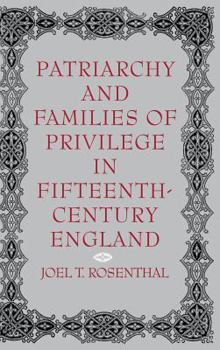Patriarchy and Families of Privilege in Fifteenth-Century England
There are, contends Joel Rosenthal, two suppositions that have achieved almost full and unquestionable acceptance in contemporary social history and family studies. The first is that at any given time in any given culture one particular form or model of the family dominates; the second is that historical changes in the family operate in a single and compelling direction.
In Patriarchy and Families of Privilege in Fifteenth-Century England, the author joins quantitative and legal evidence with case studies to yield a depiction of the family as something at once corporeal, fictive, and symbolic.Format:Hardcover
Language:English
ISBN:0812230728
ISBN13:9780812230727
Release Date:September 1991
Publisher:University of Pennsylvania Press
Length:304 Pages
Weight:1.50 lbs.
Dimensions:1.0" x 6.1" x 9.1"
Customer Reviews
0 rating





